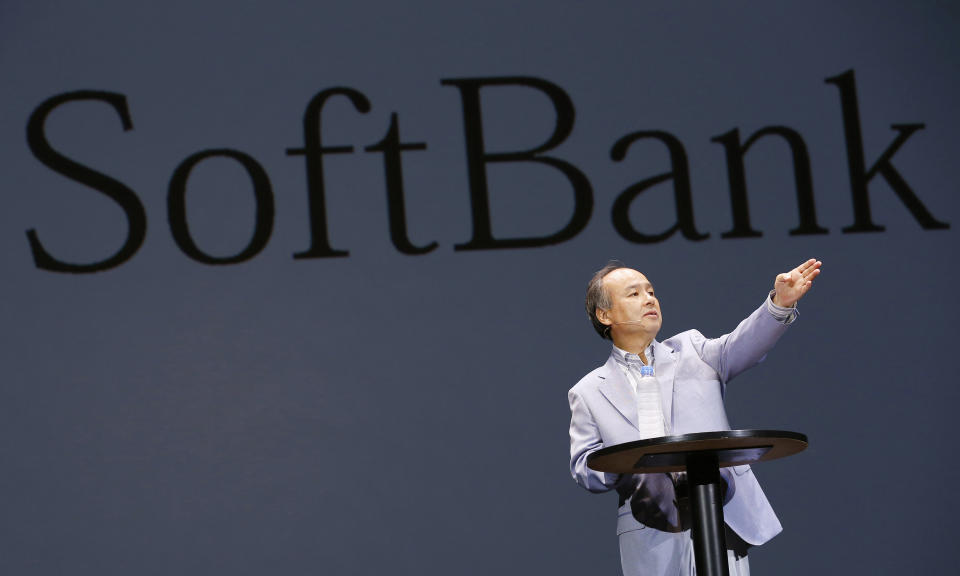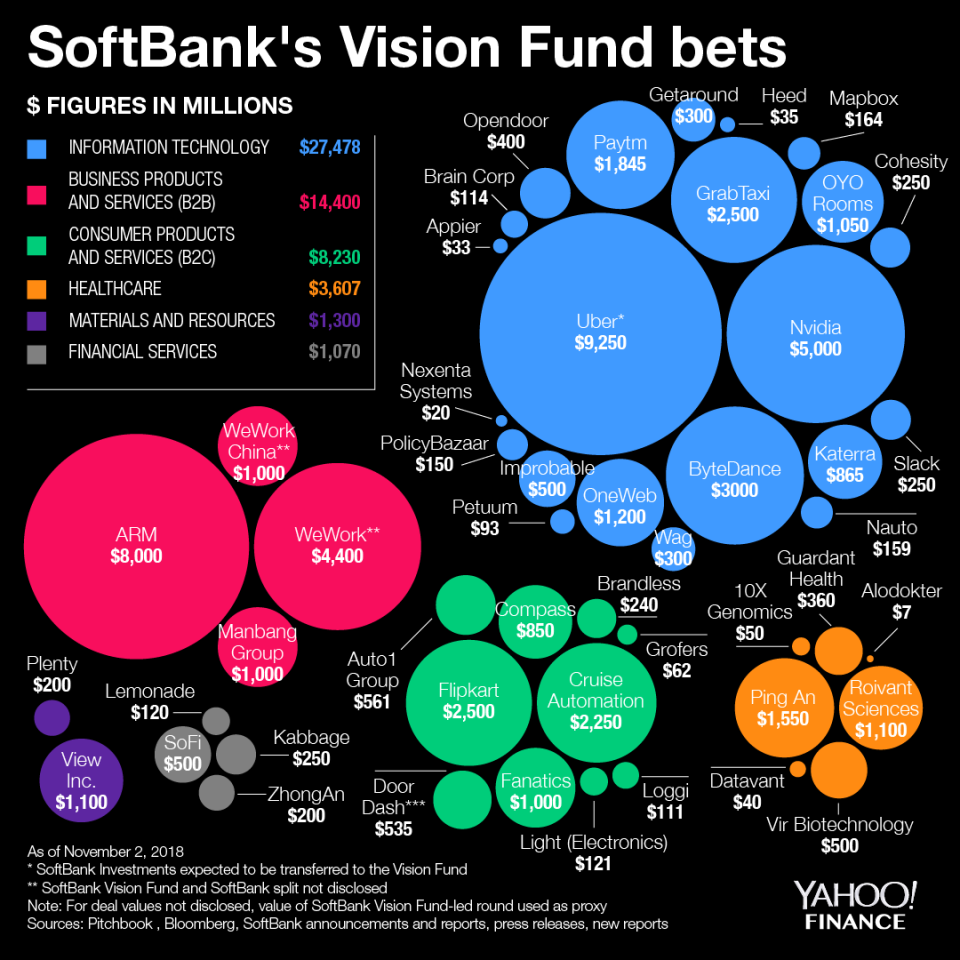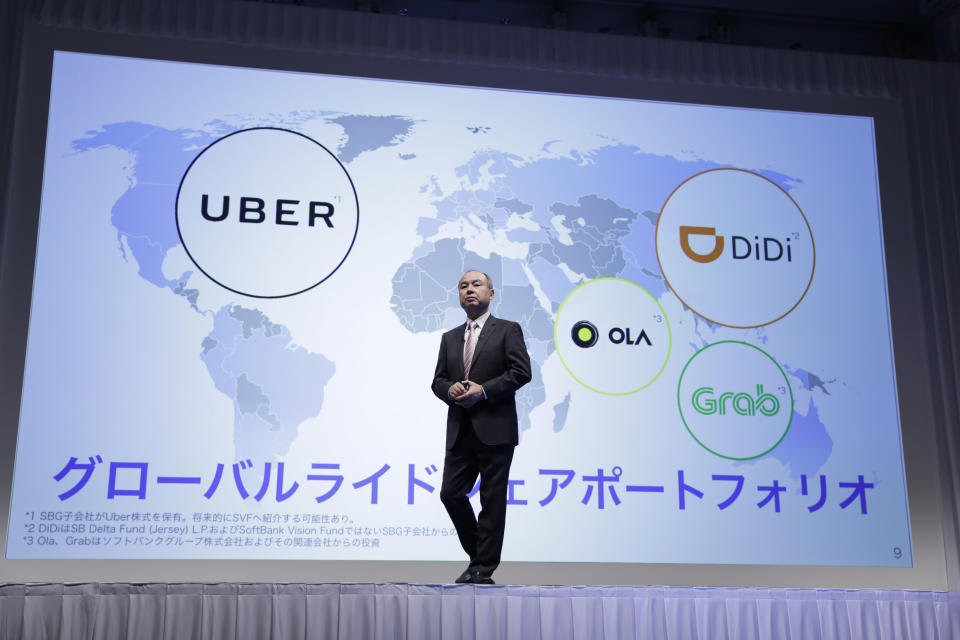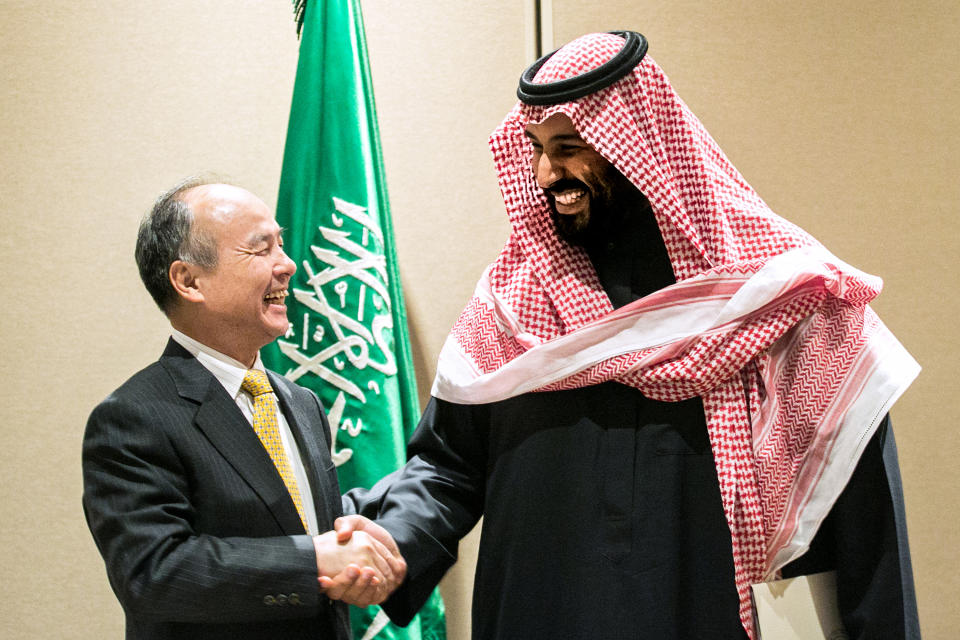Where SoftBank’s Vision Fund is deploying its $100 billion

When billionaire SoftBank founder and Japanese business magnate Masayoshi Son announced plans for his $100 billion Vision Fund in 2016 with the promise of further accelerating “the Information Revolution,” the tech world was skeptical.
Some prospective investors even reportedly laughed at the idea of a $100 billion fund when Son initially pitched it. Drawing largely from Saudi Arabia’s sovereign wealth fund, which has recently become a controversial source of capital, and SoftBank itself, The Vision Fund’s dollar ammunition dwarfed every fund that has come before it, according to Dealogic. For comparison’s sake, in 2017 total venture funding in the U.S. totaled $84 billion.
But if there were doubts that such a large war chest could be put to use to snatch up blossoming startups in such a short period of time, Son has proved them wrong. Since launching in 2017, the fund has already exhausted about half of its capital, according to Bloomberg, Pitchbook and reported funding data compiled by Yahoo Finance. That share increases to over 50% of its hoard if you factor in the more than $20 billion worth of positions its parent SoftBank reportedly intends to transfer to the Vision Fund, which includes stakes in ride-sharing juggernauts Uber, Grab and DiDi Chuxing.
A closer look at where Son’s Vision Fund is placing its bets reveals an interesting look into the mind of the visionary who often talks up a 300-year investing horizon and racked up $120 billion in returns off an early $20 million bet on a then-unproven Alibaba (BABA).

Not just purely innovative tech
The first thing worth noting is which industries the fund has targeted. For a fund focused on tech, it’s not surprising to see the majority of its dollars have flowed into IT companies like UK-based virtual reality maker Improbable and chipmaker Nvidia (NVDA), which was through a transfer of a stake held by SoftBank. Then there are the softer tech companies like China’s ByteDance which owns Vine-like video apps Musical.ly and TikTok, or India’s Oyo Rooms, which aggregates budget hotels and accommodations. What might be more eye catching, though, is the outright size of the bets its placing in the better-known consumer products and services names that might fall outside of its original mission to invest in cutting-edge technology.
For example, the Vision Fund invested $240 million in e-commerce startup Brandless, which sells private label essentials, and led a $1 billion round in sports merchandising company Fanatics in September 2017. The Fanatics deal was finalized a month after Uber CEO Dara Khosrowshahi took the reigns of the ride-sharing giant. Khosrowshahi resigned from Fanatics’ board around the same time he took the helm of Uber, which will have received the most in Vision Fund dollars if SoftBank’s stake is rolled over as expected.
Son has also channeled a significant portion of his fund to business-to-business startups, including an $8 billion stake in British chip maker ARM, a more than $1 billion position in China’s “Uber for trucks” company Manbang, and over $4.4 billion to office-sharing startup WeWork. The fund is reportedly in discussions to commit another $15 billion to $20 billion to WeWork, despite its accelerating losses.

If the deal does go through, there would perhaps be none more symbolic of the way the fund has been run by Son so far. Its investments have earned the Vision Fund a reputation that mimics Son’s record of writing huge checks that often steamroll other VCs.
Take for example the latest investing round in Wag, a dog-walking startup Son has affectionately referred to as “Uber for dogs.” Initially, the company had planned on raising $100 million in funding with interest from firms NEA and Kleiner Perkins. However, both firms dropped out soon after SoftBank joined the fray on the condition it wouldn’t want to invest anything below $300 million, according to The Information. Wag eventually accepted the Vision Fund’s investment.
But other VCs are gearing up to fight fire with fire. Sequoia Capital moved to raise its own $12 billion late-stage fund, according to CNBC. Kleiner Perkins broke off to chase larger deals through a separate fund as well, according to Bloomberg Businessweek, but it remains to be seen if either will compete with the sometimes lofty valuations that stem from Vision Fund investments, and by extension, Son’s decision making.
Big bets could lead to huge returns
For insight into that process, Son put it simply at a June SoftBank shareholder meeting when he was quoted by The Wall Street Journal saying, “Feeling is more important than just looking at the numbers. You have to feel the force, like Star Wars.”
Some of that “feeling” is already paying off through winning Vision Fund bets. For example, a $2.5 billion investment in India’s Amazon challenger Flipkart proved successful after the Vision Fund agreed to sell its 20% stake in the company to Walmart (WMT) for $4 billion after holding the position for just eight months. At a Tokyo press conference, Son praised the win saying, “The Vision Fund is exceeding even my track record.”
Things also look promising for portfolio company and cancer-detection firm Guardant Health (GH), in which the fund invested $360 million, according to Bloomberg. The company completed its public offering in October and saw shares climb 57% above the IPO price when trading opened. SoftBank controlled about a third of Guardant shares post-IPO.
To be fair, in order to deliver returns on par with VC expectations, Son will need to rack up more wins equivalent to Flipkart’s and Guardant Health’s scale. According to research by EquityZen, a secondary marketplace for pre-IPO stock, achieving an industry standard 20% internal rate of return will require the Vision Fund to generate over $142 billion in cash over the 12-year life of the fund. Factoring in debt payments, that would mean churning out cash successes on the scale of Spotify (SPOT) at its IPO ($26 billion) — every year — for seven consecutive years.

Additionally, in light of the latest developments concerning the alleged killing of Saudi journalist Jamal Khashoggi, many have noted how being backed by the Saudi government might further complicate the Vision Fund’s future. Even Son canceled his planned speaking engagement at the kingdom’s investment conference earlier this month after blowback led to heaps of investment leaders canceling plans to attend. A Vision Fund managing partner, however, still attended.
The close connection of the fund and backing from the Saudi government has led many to speculate that at best it could jeopardize the fund’s ability to invest in new startups and at worst could endanger a planned second Vision Fund. Those issues aside, if the Vision Fund continues to grow its portfolio of leaders in their respective fields, and can synergize them in a way that expedites growth, perhaps the bets Son has made will once again be proven winners.
Zack Guzman is a senior writer and on-air reporter covering entrepreneurship, startups, and breaking news at Yahoo Finance. Follow him on Twitter @zGuz.
Read more:
How Juul became the FDA’s latest target
Juul surpasses Facebook as fastest startup to reach decacorn status